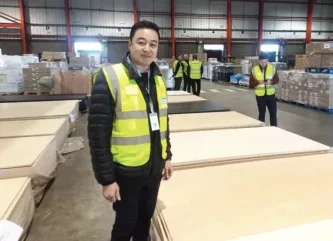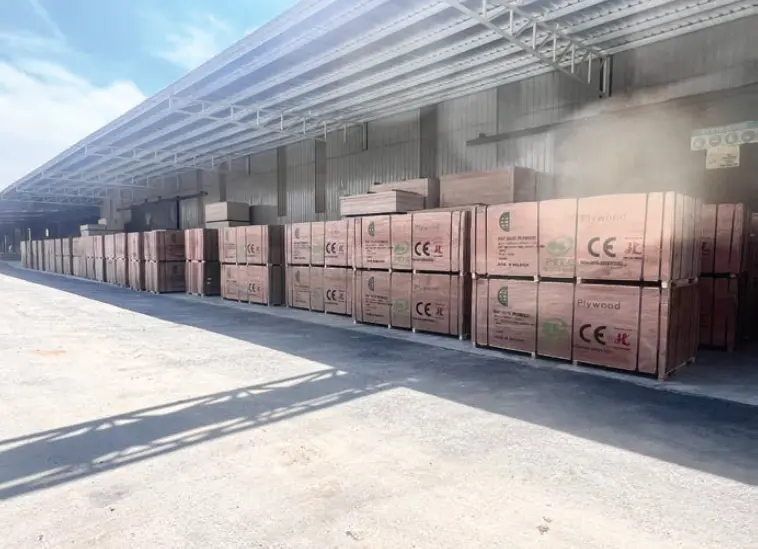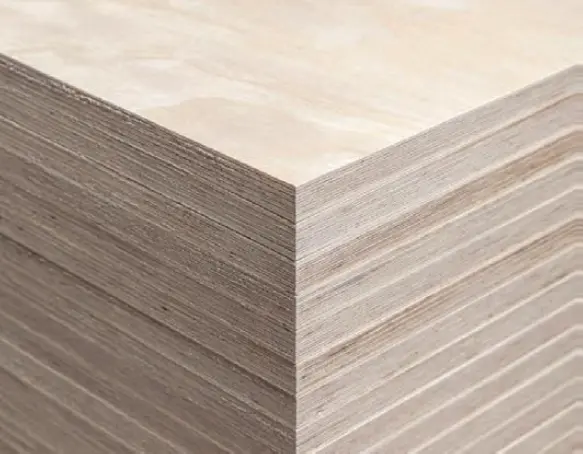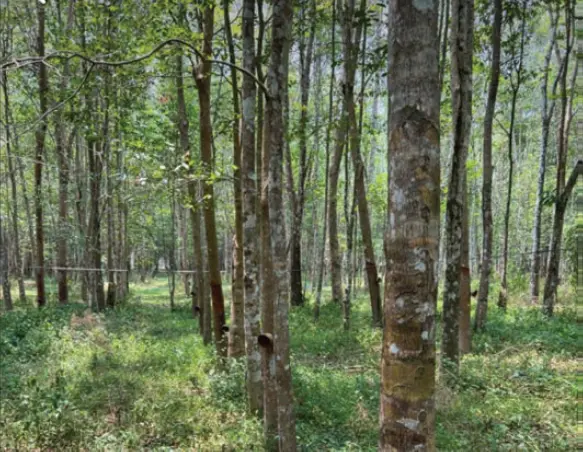
In the UK’s bustling Port of Tilbury near London, a vast array of forest products is imported from Europe and across the world.
Plywood is a major product category being imported and distributed across the UK for a variety of applications by leading importer/ distributors.
Recently, the Malaysian manufacturer Hok Lai Timber Sdn Bhd joined up with importer/distributor Plaut International Ltd to showcase the former’s rubberwood plywood core products at the port, inviting dozens of buyers to view the product.
Part of the impetus for this initiative was the change recently seen in the international birch plywood market following the onset of the Ukraine/Russia conflict and the subsequent sanctions on Russian birch plywood products coming into Europe.
Birch plywood has been a big product category across Europe and the UK, with the product known for its strength, durability, and smooth surface finish, making it ideal for various applications including furniture, cabinetry, and construction.
Obviously, birch ply trade volumes have taken a hit since the sanctions on Russian and Belasrusian products. Alternative products from reliable supply channels are being sought by users to fill this gap.
Hok Lai’s solution is its rubberwood core “Birch Replacement” plywood, suitable due to its availability, cost-effectiveness, and quoted eco-friendly properties.
HOK LAI INVESTING IN PRODUCTION
Hok Lai Timber (M) SDN BHD was first established in 1992 and was founded by the late Per Eng Lee. Over the years, the company experienced a rapid growth from a small sawmill to one of the largest sawn timber and plywood suppliers and exporters in Malaysia. It also produces veneer and wood pellets.

Mr Lee’s son Per Chin Poh is the young managing director of the business at the age of 30. In fact, the average age of the management team is just 33 – a fact which transfers into the company’s modern, forward-thinking approach to business.
The company has invested significantly in its production processes and equipment in recent years to position itself as a manufacturer of high-quality plywood.
Per Chin Poh said Malaysia has extensive rubberwood plantations, with the material being used a lot for furniture production. The wood is harvested from plantations after the end of their latex-producing cycle.
The abundance and sustainability of the fast-growing raw material appealed to the Hok Lai team to innovate with its use in plywood production.
When some questioned the suitability of rubberwood for plywood, the company persevered, conducting tests and refining its manufacturing techniques, using the multilayer technique to improve the strength and durability of plywood.
Per Chin Poh said the R&D has resulted in a birch replacement plywood that is being embraced by builders, architects and craftsmen on several international markets.
“Plywood is a very traditional product, but we want to make it more modern,” he told TTJ.
He added that the plywood market often sees a variance in the finishing and product quality, with different coloured face species observed within the same packs.
“But we want everything to be in a uniform colour and reduce the defects,” he said.
Hence, the container shipment at the Port of Tilbury displayed consistency in both colour and veneer thickness and quality to show that plywood can be a modern design material like some other materials. This, he added, made it easy to sell to customers and reduced product dissatisfaction risks down the supply chain, removing potential extra time and costs.
Having good quality production processes, he added, also meant it was possible to avoid delamination issues experienced by some products on the market and provided a good solution for customers.
By coating panels with a protective finish and having different finishing options – melamine and film faced for example, Hok Lai is removing the level of processes a customer has to do to prepare the product for use.
The Hexa film-faced product comes in dark brown and black finishes and the applications include truck bed/wall linings.
In addition to the Birch Replacement product, Hok Lai has numerous product options including melamine plywood in birch/oak/beech, MR/interior plywood for laser cutting, BS1088 marine plywood, pine faced plywood, white birch faced plywood and white poplar plywood. Products shown at the Tilbury showcase were 9mm-18mm in thickness.
Certifications/standards met include CE2+, CARB P2 EPA, TSCA and PEFC.
The management has adopted new technology to increase production volume as well as bring profit and recognition in the wood industry.
MORE COST-EFFECTIVE
The full rubberwood plywood is priced as more cost-effective than full birch plywood.

“We come at the market with a lot of education about plywood,” said Per Chin Poh.
“Sometimes buyers on the market can pay a lot for products that are not suitable. We get to know the customers and give them a solution to solve their problems. We can really follow the customer, depending on what they want.”
The Hok Lai factory currently has a production output of 3,000-4,000m3 per month but investment plans within the next two years will increase this to 10,000- 14,000m3 monthly. Value-adding and automation will be features of the investment.
Hok Lai uses traditional machinery suppliers and Chinese technology/machinery partners for its equipment.
Hardwood plywood wood veneer species used include meranti, jelutong, keruing and mersawa.
Certainly, the Malaysian plywood sector is keen to promote its competitive edge with its rubberwood plywood at a time when demand for sustainable and cost-effective materials is increasing.
It also believes stability in the country insulates it from geo-political problems and anti-dumping duties potentially impacting other supplier countries.
Malaysian government policies and support for its timber sector is further boosting the plywood industry, boosting R&D, skills training and infrastructure.
In conclusion, Malaysia says its advantages in rubberwood plywood production are poised to grow in the coming years due to favourable trade dynamics, supportive government policies, strategic location, strong international relations, and active engagement in international forums.

Buyers diversifying their plywood sourcing can improve supply chain resilience and reduce dependency on specific regions for raw materials, mitigating risks associated with disruptions in birch plywood supply,
In short, the Malaysian plywood sector believes rubberwood plywood can penetrate new markets or segments where price sensitivity is high, without compromising quality.
The Hok Lai range of products is available through London-based Plaut International Ltd.


